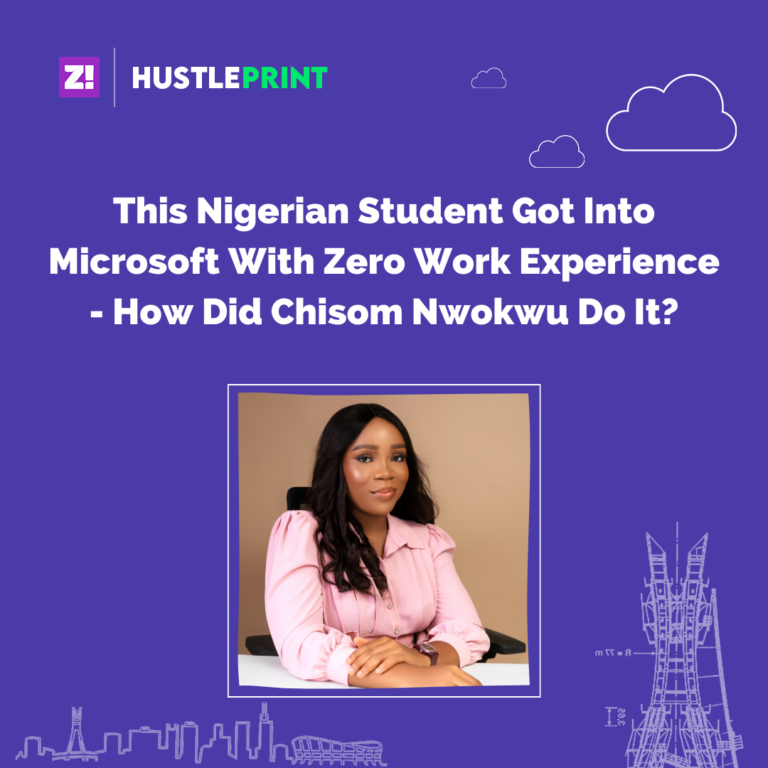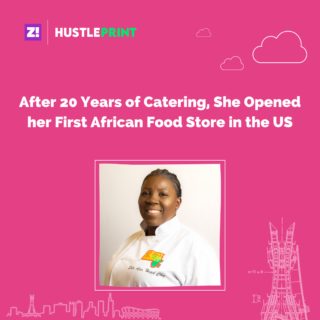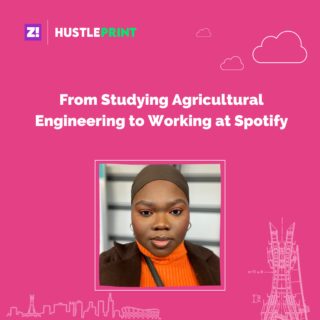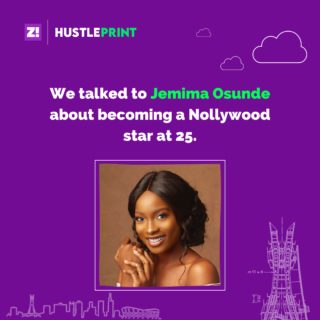Navigating life as a woman in the world today is interesting. From Nigeria to Timbuktu, it’ll amaze you how similar all our experiences are. Every Wednesday, women the world over will share their experiences on everything from sex to politics right here. This is Zikoko’s What She Said.
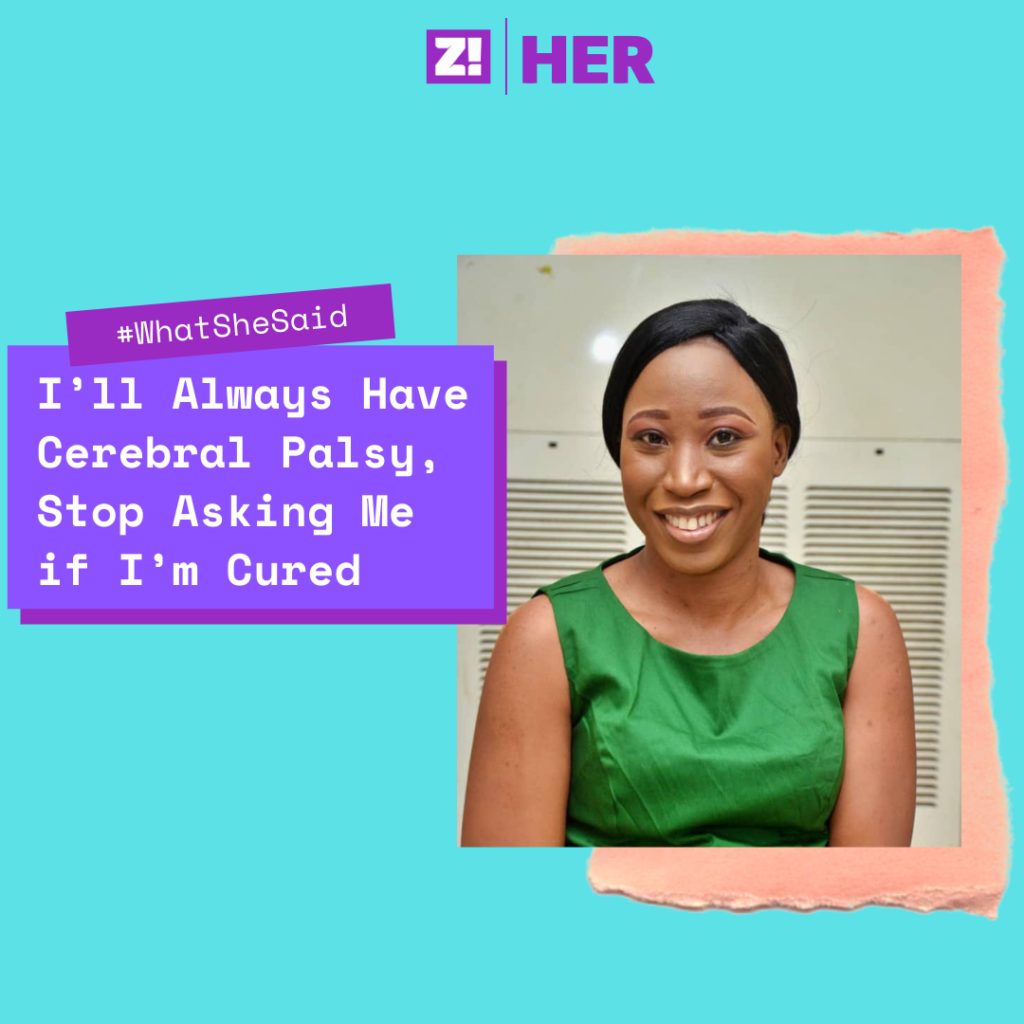
Cerebral palsy (CP) is a neurological disorder that affects muscle tones. Depending on the severity, a person with CP struggles with movement and coordination. The subject for this week’s #Zikokowhatshesaid is Tobiloba Ajayi, a Nigerian woman living with CP in Nigeria. She talks about growing up without knowing she had a disability, finally realising she was different in primary school, the unending cycle of questions that followed and the emotional stress she never told her parents before they died.
As someone living with CP, what’s one thing you constantly deal with?
Questions. Nigerians ask a lot of them. “Why do you walk funny?” “You went to school?” “Are your parents rich?” “How come you can speak so well?” Endless, annoying questions.
When did these questions start?
I’d say since I was born. Well, my parents dealt with that, but they shared the stories. People asked why they decided to have a fourth child once they saw that I had a disability. I was born premature and some went as far as asking my mum to take me to church — someone even suggested abandoning me. Nigerians have lacked decorum since 1985.
I didn’t even know I had a disability. I played a lot with my three older siblings. We were partners in crime. As long as my siblings were doing it, I was doing it too.
The same happened with chores at home. Washing plates as a kid was turn by turn. There was no “Ah, but Tobi can’t stand.” My mother simply had a carpenter make a high chair for me to sit and wash. My parents made sure I was able to adapt to anything. No one asked questions about why I was sitting to wash. It was normal; I never felt different. I probably should have known something was off because I didn’t go out as often as my siblings did.
Why do you think so?
When I started school, my classmates asked a lot of questions. I was five, and it was the first time I interacted with people outside my family. Some girls in my class asked why I couldn’t walk. I didn’t have an answer. They tried pulling me up to see if I could stand, but I just went right back to the ground. They weren’t trying to bully me, they were just curious. And for the first time, so was I. When I got home, I asked my mum why I couldn’t walk.
How did she react?
She wasn’t surprised. My mum was a nurse, I’m sure she expected the question sooner. The next morning, I woke up to a book on my table, the picture book of the developing human. She knew I’d read it because I loved books. I asked if I looked like the babies in the book, but my parents didn’t take any pictures of me until I turned 1. They didn’t want constant reminders of me if I died.
My mum tried her best to explain CP in five-year-old language.
“There’s a part of your brain that makes your muscles weak, but it doesn’t mean you’re not as smart as the other kids,” she said. That’s the same thing I told the girls at school. After that, everyone was chilled. If the teacher didn’t write clearly, they’d shout, “Tobi can’t see o!”I became quite popular.
So sweet. Did you meet any other kids with CP?
Nope. It never even crossed my mind to look for someone like me. Secondary school was the first place I met someone else with CP. We never said more than a hi or hello to each other. I had a lot going on in my own life by that time.
What was happening?
After primary school, I went through five surgical procedures in the US to straighten the muscles in my legs. I had to learn to walk at 12. The pain after the surgery was excruciating, but I never mentioned this to my parents or siblings. The surgery was something they had openly prayed about for years. I felt I needed to be grateful, to be thankful for the privilege to walk. Even my siblings weren’t going to understand why I’d be complaining. After all, I got to travel to the US and walk again. I had to suck it up.
I spent a year in recovery. Even when I could walk, I needed a cane for support. That was hard to deal with as a secondary school student.
In school, the question shifted from, “Why can’t you walk?” to “Why are you walking with a cane?” I was in the secondary school section of my primary school, but most of my old friends were either a year ahead of me or in a different school. I had to explain CP to my new classmates, and this time, why I needed a cane to walk.
Since I couldn’t run, some of the kids took it as a cue to bully me. I still had friends that showed up to fight for me sometimes. Other times, I was on my own.
I’m sorry about that. Did you tell anyone at home?
Thanks. No, I didn’t. My older siblings were in boarding houses at different schools. As for my parents, I felt the same need to be grateful. My siblings were in public schools, and I was in a private school. It was obvious they were spending more money on me. I had to read the room and deal with the bullying myself.
Even when my siblings were back home, I didn’t talk to them about the bullying. We just had our usual fun around the house and they’d gist me about boarding school. I wasn’t the type to open up.
So what did you do?
I bottled up my emotions again. Listening to music was how I dealt with it. I loved listening to the piano because it made me feel calm. Anytime I wanted to get away, I’d go to the music room at school either to read or listen to someone play.
Did you learn to play?
No. I wish I could though. I just hummed or sang along. Our music teacher heard me sing one time and roped me into joining the school choir. Being in the choir was a cool thing. It gave me some street cred. I was now the girl with a cane that could sing fire.
So the popular babe was back?
She flexed until JSS 3. For SS 1, my parents decided to bundle me off to boarding school.
Boarding school ke?
LOL. Yeah. My father decided I needed to experience life. My mother was on board because she felt I was getting too spoiled. I’d wake up late for school or whine about food and requested to eat weird things like rice and butter. They were tired. I didn’t have any room to be upset or protest. My father’s mind was made up.
And so you had to onboard a new set of people again?
Yes. Barely two weeks in, it was clear I was in the trenches. I had to fetch my water, wash my clothes, and struggle my way to get my food in the dining hall. And the roads? There were so many potholes. Walking was difficult. Once I made it to class, I never came out. Not even during break time. I couldn’t deal with the stress of the rough roads.
I was too guarded to make friends. I was scared of the cycle of making new friends, explaining my condition, changing schools and starting all over again.
Did you get over the fear?
I didn’t have a choice. There was a girl in my class, Yemisi. She kept trying to get me to go outside. When I’d say no, Yemisi would still buy things from the tuck shop and drop them on my table. I just wanted her to leave me alone. Aunty no gree.
It took nine months for me to warm up to her, but when I did, we became best friends. I even had my first relationship after that. The boy had to go through Yemisi. When I lost my mother in SS 3, that’s when I knew she’d be my friend for life. She was my rock.
I’m sorry. Before your mum died, did you tell her how you felt about the surgery or changing schools?
No. We didn’t have a close relationship. Even when I had my period, I learnt how to wear a pad from watching my older sister. My mum and I weren’t the types to gist. I didn’t even allow myself to process any of that when she died.
After secondary school, I got into uni almost immediately.
How was uni?
Chilled. It was the one place people were too distracted to ask questions about my condition. I decided to study law, so I was also buried in classes. Yemisi was in a different department, but I had my best friend. I also moved on to another relationship. I didn’t have any time to deal with the emotions I bottled up.
Uni became my safe space. If I was home at all, it was for a few weeks.
Why was it so hard to be home?
It felt lonely. My siblings were much older and out of the house. So I looked forward to going back to school. My dad tried his best though. When I was in school, he’d show up once a month. I’d gist him about classes. Funny thing is, we talked about boys a lot.
We talked about everything but nothing at the same time. But we never fully opened the pandora box that was my growing up.
Did you try to at any point?
Sort of. In 2007, the reality of my final year dawned on me. I’d be staying home for a long time, and it scared me. It scared me to the point that I wanted to overdose on pills.
Luckily, Yemisi found them in my bag before I could take them. After that, she called my siblings to pick me up from school. She made up some excuse about exam stress.
Home was lonely. That same year, I had those suicidal thoughts again. I stopped eating and lost weight. My dad noticed, but we didn’t talk about it. He signed me up for therapy. The sessions were revealing. It was the first time I dug into my childhood emotions. The first time I realised how hurt I was about everything.
My dad on the other hand was focused on me getting through law school. I went through law school on anti-depressants. Until he died in 2021, we never talked about how I felt.
I’m sorry—
Thank you. I wish we did though. I’ve gradually opened up to my siblings about everything.
You mentioned boys. I’m curious: what’s the dating scene like as an adult living with a disability?
LOL. I haven’t had a relationship since my uni boyfriend. I fought depression for three years, a relationship wasn’t my priority. Even when I got better in 2010, I felt I needed to make up for the lost time. My next phase was more important than loving up.
What phase was that?
Building a foundation for kids living with CP. It’s been the highlight of my career.
Is that something you always wanted?
No. Not at all. I only decided to study law because I was bullied as a kid. I thought lawyers were invincible and becoming one would mean no one gets to bully me ever again. It had nothing to do with trying to fight for people with CP. After law school, the plan was to work at a firm and keep living my life. My dad steered me in a different direction.
During my NYSC in 2008, he hooked me up with a research job. I wasn’t feeling great at the time, but I didn’t object. Compared to the other PPA choice, it wasn’t bad. The job was focused on people with disabilities, so my dad thought I could contribute. He was right.
After that experience, I travelled to the UK for a master’s degree in 2011 and dived deeper into the development sector for people living with disabilities. A few years later, I blew. That’s how they say it yeah?
LMAO. I’ll allow it —
LOL. I was selected for the Mandela Washington Fellowship and my story went viral. Nigerian parents flooded my DM asking for help. People started asking how I went to school. They didn’t believe someone with CP could be educated.
Some of these parents talked about their kids being rejected from schools. It broke my heart. I knew life with CP had its downsides, but at least my parents made sure I went to school. That was the motivation for my foundation. We focus on connecting parents to the right teachers, schools and resources for CP. So far, I’ve helped 470+ families in 16 Nigerian states.
I love it. What’s next for you?
Nothing adventurous. I want another master’s degree in inclusive education. It’ll help me do the work I do even better.
At 37, what’s one question Nigerians need to stop asking?
“How did you overcome cerebral palsy?” I hate it.
Why?
Because CP is a life-long condition. It’s not a sickness that is overcome. No matter the surgeries I go through or the feats I achieve, I will always be a woman living with it.
For more stories like this, check out our #WhatSheSaid and for more women like content, click here

